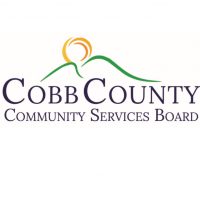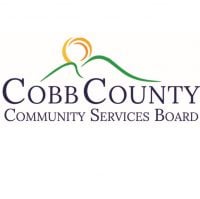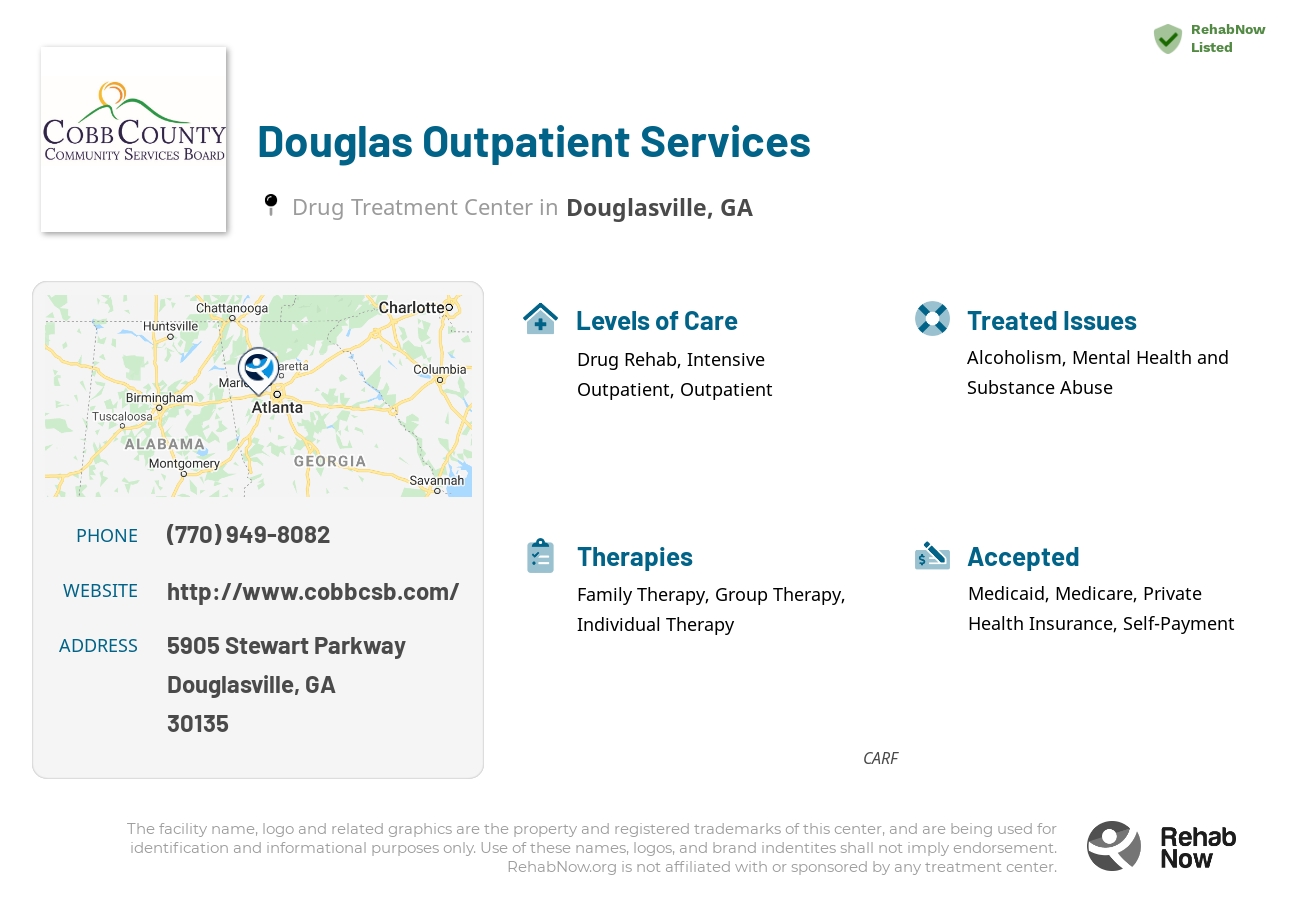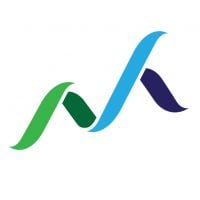
Douglas Outpatient Services
Drug Rehab Center in Douglasville, Georgia
- Dual Diagnosis
- Drug Addiction
- Alcoholism
Douglas Outpatient Services is an accredited addiction treatment facility with experienced, compassionate staff that offers a wide range of levels of care, from outpatient to residential, for those suffering from alcoholism, dual diagnosis, and drug addiction in a supportive environment.
About Douglas Outpatient Services in Georgia
Detox with Dignity, located in Alpharetta, Georgia, is renowned for its commitment to helping individuals struggling with substance abuse to achieve sobriety. Unlike its name suggests, Douglas Outpatient Services is its sister facility in Douglasville, Georgia, extending tailored, comprehensive care specializing primarily in alcoholism, dual diagnosis, and drug addiction treatment. Its notable focus on personal empowerment and innovative care sets it apart.
Accredited by the Commission on Accreditation of Rehabilitation Facilities (CARF), Douglas Outpatient Services stands out for its high standards in addiction treatment. This facility provides a spectrum of services, including detox, outpatient, and residential care, designed to meet the varied needs of those it serves, ensuring that care is both accessible and effective.
- Offers a Detox with Dignity program, ensuring a supportive and respectful start to recovery.
- Provides comprehensive outpatient and residential treatment, catering to varying levels of addiction severity.
- Tailors treatment to individual needs, facilitating a more effective and personal recovery journey.
Douglas Outpatient Services addresses a wide range of addictions including alcoholism, drug addiction, and cases of dual diagnosis. Utilizing innovative treatment methods and offering several levels of care, from outpatient support to intensive residential rehabilitation, the facility equips individuals with the necessary tools for lasting sobriety.
Genders
Ages
Modality
Additional
Accreditations

CARF
The Commission on Accreditation of Rehabilitation Facilities (CARF) is a non-profit organization that specifically accredits rehab organizations. Founded in 1966, CARF's, mission is to help service providers like rehab facilities maintain high standards of care.
Conditions and Issues Treated
Levels of Care Offered
This center offers a variety of custom treatment tailored to individual recovery. Currently available are Drug Rehab, Intensive Outpatient, Outpatient, Residential, with additional therapies available as listed below.
Addicts who need help with their addiction can enroll in an intensive outpatient program (IOP). But the patient won’t live there during treatment.
IOP involves patients visiting a medical office building regularly for therapy and other services while continuing to live their lives.
IOP is a step up from drug or alcohol detox, but it’s still a phase of recovery, not the end goal. Patients in need of IOP have many options for rehab and treatment.
Outpatient treatment is considered the lower intensity level of addiction treatment. It’s ideal for early phase addiction or lower intensity addictions. It may include weekly sessions instead of daily. It may include weekly sessions instead of daily. Peer group support, 12-step programs, and individual counseling may still be involved but at a lesser frequency than an intensive outpatient program. It is a good choice for someone who doesn’t need to go through a medically supervised detox and who has a supportive home environment. It requires motivation and dedication to commit to the program without constant monitoring.
Residential treatment programs are those that offer housing and meals in addition to substance abuse treatment. Rehab facilities that offer residential treatment allow patients to focus solely on recovery, in an environment totally separate from their lives. Some rehab centers specialize in short-term residential treatment (a few days to a week or two), while others solely provide treatment on a long-term basis (several weeks to months). Some offer both, and tailor treatment to the patient’s individual requirements.
Therapies & Programs
Individual therapy involves one-on-one sessions between the patient and therapist. It provides patients with a safe environment to openly discuss personal and sensitive issues with the therapist. They find the therapist as someone they can trust. Individual therapy aims to identify the core issues that would have led the patient to substance abuse and address them effectively. The therapist can develop patient-specific customized solutions through individual therapy, which aids speedier recovery.
Family therapy is a group problem-solving that aims to improve communication and relationships between the addict, their family, and sometimes friends. The main goal of family therapy for drug addiction is to create an environment where communication can occur without judgment, hostility, or blame. The therapist is with the family as they learn to communicate differently, especially with the addict when s/he is using. The family can learn to reduce their enabling behavior or rally together and support each other during tough times.
An addict’s family can play a vital part in helping them to avoid relapse because they can spot the warning signs and help them get back on track before it becomes too much of a problem. Family therapy is one of the most effective ways to help addicts stay on the path to long-term sobriety. When a drug addict decides that they want to try and get sober, it takes the support of every person they love to succeed. It can be incredibly difficult for loved ones to watch an addict go through the pain and suffering of withdrawal, but by being there with them and supporting them, they can help to make sure that the addiction never returns.
Groups typically involve meetings with other recovering addicts who can relate to one another’s experiences. They might meet in person or online and typically focus on the process of staying sober rather than overcoming a specific addiction.
In these groups managed by Douglas Outpatient Services, addicts can build a sense of community and develop strong emotional connections with others who understand what they are going through. These beneficial relationships can help addicts overcome their cravings and prevent relapse at any point during the recovery process.
Since addiction is a chronic physical and mental illness, addicts need to learn as many life skills as possible. Many drug treatment centers offer life skills activities as part of their addiction recovery programs. Examples include cooking classes, employment training, resume writing seminars, parenting classes, and computer training. Life skills activities help addicts find employment, take care of their families, and give back to the community.
Payment Options Accepted
For specific insurance or payment methods please contact us.
Is your insurance accepted?
Ask an expert, call (888) 674-0062
Additional Details
Specifics, location, and helpful extra information.
Douglasville, Georgia 30135 Phone Number(770) 949-8082 Meta DetailsUpdated April 15, 2024
Staff Verified
Douglas Outpatient Services Patient Reviews
There are no reviews yet. Be the first one to write one.
Douglasville, Georgia Addiction Information
Prescription opioid use has caused a large increase in the total amount of overdoses in Georgia. Almost 12% of the Georgia population uses illicit drugs each year, and slightly over 3.5% also abuses alcohol at the same time. This does not include those who binge-drink at least once a month, which includes 20% of all Georgians.
8.5% of Douglasville residents age 12 and older reported using illicit drugs in the past month. The average age of someone abusing drugs in Douglasville is 24 years old. Douglasville has a rehabilitation rate of only 16% for drug addicts that seek help, leaving 84% untreated. If you or someone you know is struggling with addiction, please seek help as soon as possible.
Treatment in Nearby Cities
- Cairo, GA (199.2 mi.)
- Hiram, GA (11.0 mi.)
- Hamilton, GA (66.6 mi.)
- Doraville, GA (30.7 mi.)
- Augusta, GA (160.0 mi.)
Centers near Douglas Outpatient Services


The facility name, logo and brand are the property and registered trademarks of Douglas Outpatient Services, and are being used for identification and informational purposes only. Use of these names, logos and brands shall not imply endorsement. RehabNow.org is not affiliated with or sponsored by Douglas Outpatient Services.



